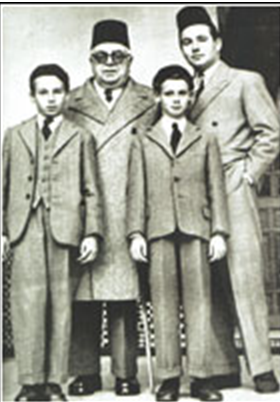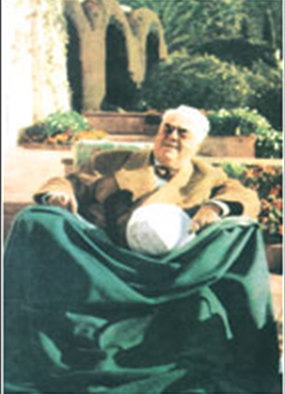Aga Khan III, Sir Sultan Muhammad Shah
This is a collection of articles archived for the excellence of their content. Readers will be able to edit existing articles and post new articles directly |
Aga Khan III, Sir Sultan Muhammad Shah
July 08, 2007
REVIEWS: In his own words
Reviewed by Munir Moosa Sewani
July 11, 2007 will mark 50 years of the imamate of Prince Karim Aga Khan. His grandfather and predecessor Sir Sultan Muhammad Shah Aga Khan III left behind a valuable account of his life and times
Prince Aga Khan III, or Sir Sultan Muhammad Shah as he was also known, was the 48th hereditary imam or spiritual leader of the Ismaili community. His contributions to the field of education, culture, social and economic life of the people of Pakistan, as well as for the Ismaili community all over the world, are remarkable. He began his extraordinary journey by becoming one of the leading players in the subcontinent’s politics during the crucial years of Muslim awakening. He had close friendships and affiliations with the Quaid-i-Azam, Allama Iqbal, Sir Syed Ahmad Khan, Queen Elizabeth, Mahatma Gandhi, Lord Mountbatten and numerous other famous personalities. Throughout his life he sedulously endeavoured to improve the situation of the Muslim community. In his memoirs, Sir Sultan Muhammad Shah has shared the many experiences of his life and the great events that took place during it.
He was born on November 2, 1877 in Karachi. He writes about how he spent his early years in Bombay and Poona. The Prince was trained since early childhood to be conscious of his responsibilities. At the tender age of eight the imamate was passed on to him when his father Imam Shah Aly Shah passed in 1885. His mother was a granddaughter of Fath Ali Shah, the second ruler of Persia’s Qajar dynasty. He gives details of the typical and unchanging pattern of his days during the years 1885-1895 and how he was raised with rigid discipline regarding his education and his responsibilities as a hereditary imam.
Next, he shares experiences of his adult life as more and more duties related to his position were expected of him. The 18th year of his life opened new horizons for him. He recounts several memorable events, including his meetings with Mark Twain, Queen Victoria, King Edward and many other well-known British personalities during a visit to England. This tour stimulated his keen interest in world politics and diplomacy.
The chapter titled ‘The crucial nine years from 1900-1909’ covers many important events, including the formation of the All India Muslim League, the Muslim educational conference, his visit to Africa and New York and finally the Aga Khan’s major contribution for Aligarh Muslim University in terms of collecting funds and providing financial support. He became the first president of All India Muslim League in 1906 and performed his duty with keen dedication for the uplift of the Muslim community. The years 1910 to 1914 were particularly eventful due to the births of his sons Mehdi and Aly.
He said about his memoirs, “I can only say to everyone who reads this book that it is my profound conviction that man must never ignore and leave untended and undeveloped that spark of the divine which is in him.”
The First World War broke out in 1915. Sir Sultan Muhammad Shah made many efforts during the war years to control the situation, particularly in Egypt where the tense political situation and fear about the war’s outcome created much anxiety among the people. At the end of the war, when Turkey emerged from it beaten and threatened with extinction, the Aga Khan, along with other Indian Muslim leaders, used his influence to save it from an ugly fate. In 1924 he was nominated for the Nobel Peace Prize for his efforts to maintain peace between Turkey and the western powers after the peace agreement.
Although he was a staunch supporter of British rule in India, Sir Aga Khan held an all India Muslim conference in 1928 in Delhi to formulate Muslim views on the way in which Indian independence should evolve. He participated in all three related Round Table Conferences in 1930-1932 as chairman of the Muslim delegation. And in 1947 when Pakistan came into being, many initial difficulties arouse due to the nature of the partition of India and Pakistan. He played an active role in resolving these problems and remained a well-wisher of Pakistan until his death in Switzerland on July 11, 1957. He was buried in Egypt.
Sir Sultan Muhammad Shah lived to celebrate the silver, golden, diamond, as well as platinum jubilee of his imamate. On all four occasions he was measured with silver, gold, and precious jewels which were to be used for the uplift of the people. He appointed a committee himself to devise the best means of utilising the money for general welfare.
Now his grandson Prince Karim Aga Khan IV, who is the 49th hereditary imam, is continuing his efforts for the welfare of humanity all over the world in the fields of culture, education and healthcare. About his memoirs Aga Khan III said, “I can only say to everyone who reads this book that it is my profound conviction that man must never ignore and leave untended and undeveloped that spark of the divine which is in him.”
World Enough and Time: The Memoirs of Sir Sultan Mohammed Shah Aga Khan III
By Sir Sultan Muhammad Shah Aga Khan III Published in 1954 by CASSELL & CO Ltd 37/38 St. Andrew’s Hill, Queen Victoria Street, London, E.C.4 Reprinted in Pakistan by DAWN Group of Newspapers, Pakistan Herald Publications Pvt Ltd Available with Liberty Books Next to Bar B.Q. Tonight, Shop No. G-1, Plot # GP-5, Block 5, Clifton, Karachi Tel: 021-5374153 www.libertybooks.com ISBN No. 969-8837-11-6 Volume 1: 175pp Volume 2: 216pp. Rs3, 500

